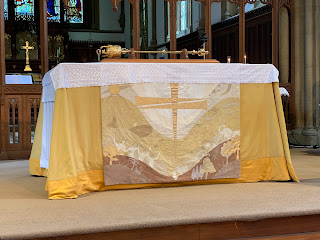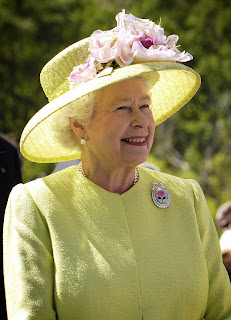Sermon preached at the Civic Service, Buckingham Parish Church
Sunday 7th May 2023
It’s a privilege to speak at this Civic Service as we celebrate the coronation of King Charles III. I have to confess, though, to feeling slightly anxious. You see, I am a cleric in the non-conformist tradition – a Baptist minister to boot. In 1613, one of my Baptist forebears, Thomas Helwys, wrote a booklet and sent it to one of Charles’ forebears, James I. The pamphlet was called, ‘A Short Declaration of the Mystery of Iniquity’ – quite a snappy title in its day – which amongst other things, defended the right of all to religious liberty. It seems the King disagreed for he had Helwys imprisoned in Newgate Gaol where he died in 1616.
You can see why I might be nervous. If I am marched down to the Old Gaol in Buckingham at the end of this sermon – or even before that – I will know it has not gone well!
Yet I feel that King Charles would have a lot of empathy with Helwys. Back in 1994, he spoke of his desire to be defender of faith rather than ‘Defender of the Faith’. He was criticised at the time, not least from those within the Christian Church. More recently, he has clarified his position. In a 2015 interview with BBC Radio 2, he said:
“As I tried to describe, I mind about the inclusion of other people’s faiths and their freedom to worship in this country. And it’s always seemed to me that, while at the same time being Defender of the Faith, you can also be protector of faiths.”
To me, those sentiments are entirely appropriate in our modern-day, multicultural society. Whatever our religious beliefs or lack thereof, we should surely support the right of others to practise their faiths in the way that they choose. Liberty and justice demand it.
And yet all too often, our beliefs divide us – religious, political, philosophical. Is there something that might unite us? I believe it is service. The big idea of King Charles is an encouragement to look beyond ourselves and to serve our fellow human beings. In this, he is emulating the One for whom he is Defender of the Faith.
Our reading from Luke’s gospel is an interesting one. It was one of the suggested readings for civic services such as this. It comes in the context of the Last Supper, in which Jesus has given the disciples bread and wine as a sign of the sacrifice he is about to make, symbols of his body and blood, which will be broken and shed on the cross. Just moments after this solemn occasion, they argue about which of them is the greatest! Jesus has been serving them bread and wine, but instead of turning this act of service outward, they turn it inward and serve their own ends. They seek personal recognition for what they have done. They covet a higher status over others. These are things that may be very familiar to us from the worlds of business, politics and life in general. Grab what you can while you can! Yet Jesus turns conventional opinion on its head. Don’t be like the kings who lord it over others, he says. Don’t act like the greatest, even if that is how others regard you. Don’t be self-serving. Instead, be selfless in serving.
What might it mean for us to be selfless in service? Here are a few ideas:
· It would mean that we always seek the good of others, before our own good.
· It would mean that we always look for the best in others, whilst being the best we can.
· It would mean that we give – time, skills, money – without expecting anything in return.
· It would mean that we consider no-one to be beneath us, and all to be at least our equal.
· It would mean that we are willing to have even the most unlikely people serve us.
· It would mean that we serve not only as a means to an end, but as an end in itself.
· It would mean that we recognise, as Justin Welby stated yesterday, that service is love in action.
This is completely in line with the Christian Faith and the other faiths that Charles protects. Jesus asks his warring disciples a rhetorical question: ‘For who is greater, the one who is at the table or the one who serves? It is not the one at the table? But I am among you as one who serves.’
There is a much-repeated saying from Shakespeare’s Twelfth Night: ‘Some are born great, some achieve greatness and some have greatness thrust upon them.’ We could say that Charles our new King was born to greatness. From as early as he’s been able to understand, he will have known he would one day be king. That is beyond his control. He may one day have greatness thrust upon him, and that too may not be of his choosing. Yet it may be through serving our nations and commonwealth, and encouraging us to serve, that he achieves greatness. I loved that the Coronation opened with words spoken by a child: ‘Your Majesty, as children of the kingdom of God we welcome you in the name of the King of kings.’ And I was heartened at the reply of Charles: ‘In his name and after his example I come not to be served but to serve.’
Christians believe that there is no higher king than Jesus, the King of kings, and this is the One before whom Charles yesterday made his promises. And this higher King, Jesus the Christ, was willing to serve others even to the cost of his life on the Cross. I believe that King Charles will serve us well. He already has for many years. For him as for us, it is often as we bless others with acts of service that we are ourselves blessed. It feels good to serve. It gives purpose. And like us, Charles will face the question: will he – will we be selfless in serving others, whatever the cost, whatever the sacrifice? That is the challenge that comes to each of us from the life – and death – of Jesus.
Let me finish with the words of a modern hymn concerning Jesus, the King of kings whom I seek to follow:
‘So let us learn how to serve
And in our lives enthrone him
Each other’s needs to prefer
For it is Christ we’re serving.
This is our God, the Servant King,
He calls us now to follow him,
To bring our lives as a daily offering,
Of worship to the Servant King.’











